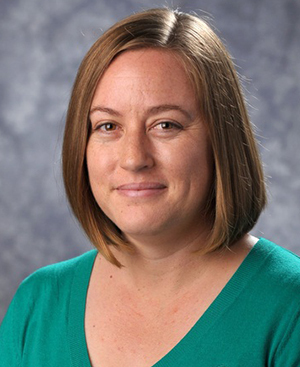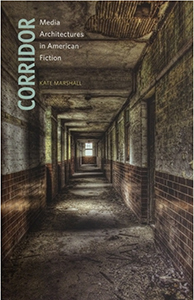 Kate Marshall
Kate Marshall
Kate Marshall, Notre Dame’s Thomas J. and Robert T. Rolfs Assistant Professor of English, has been awarded the 2014 Dorothy Lee Award for Outstanding Scholarship in the Ecology of Culture for her book Corridor: Media Architectures in American Fiction.
The award, presented by the Media Ecology Association, honors works that focus on the ethnographic or intercultural analysis of communication, perception, cognition, consciousness, media, technology, material culture, and/or the natural environment.
The Media Ecology Association is dedicated to promoting the study, research, criticism, and application of media ecology—how media and communication technology influence individuals and society.
Marshall, who is also a faculty fellow at the John J. Reilly Center for Science, Technology, and Values and a concurrent faculty member in the Department of American Studies, specializes in 20th- and 21st-century American literature, media and technology, and critical theory.
A Brilliant Blueprint

“Kate Marshall has a fresh way of looking at the novel as a kind of machine for observation—one that observes modern society by literalizing communication as physical space,” said Laura Dassow Walls, the William P. and Hazel B. White Professor of English.
Mark Goble, associate professor of English at the University of California, Berkeley, agrees, calling Corridor “a remarkably provocative account of the fictions and psychologies that inhabit the architectural spaces of modern life.”
“By paying close attention to the plumbing, duct work, air shafts, and other forms of infrastructure that invisibly shape our built environments, Marshall provides a brilliant blueprint for reflecting on just how self-knowingly literary works can materialize the worlds that make them,” Goble said.
These medial objects, which circulate materials and messages, Walls said, both separate and connect us. For instance, the hallway separates neighbors from each other, but it’s also how they connect; airshafts circulate air, and along with it, voices and cooking smells.
“What Kate does is kick this up a notch by saying, novels are ‘corridors’ too—and they know it!” Walls added. “So, that physical book you are holding is a corridor, like a hallway, but unlike the hallway, the book reflects on the very fact that it carries messages, and reflects on how it does that.
“Kate’s book unfolds some complex ideas, but she gives us a really exciting way to think about what happens when you read a book, or when a book reads you—folding you into its way of mediating the world.”
Marshall argues that a range of novels fitting uncomfortably in the study of American modernism—by Theodore Dreiser, Richard Wright, Willa Cather, and Philip Roth, for example—refer to their own status as media in this space. “These novels demonstrate a heightened amount of anxiety about the epistemological status of the corridor in the early decades of the 20th century that had significant consequences for the figuration of modern persons and their interiors.”
Corridor, she said, works with systems theory and German media studies, two approaches often unfamiliar in the American academy, to develop a new idiom for literary criticism.
The Nonhuman Turn
For her next project, Marshall is further exploring some of the concepts she researched for Corridor.
“My new work takes up some of the narrative premises with which I was working and extends them into a much larger range of literary history,” she said.
The book, tentatively titled Novels by Aliens, investigates the role of nonhuman narrators in 21st-century literature and asks what these characters reveal about the questions motivating the “nonhuman turn” in the humanities.
“In this work, I argue that the resistance to anthropocentrism that animates contemporary critical debates surrounding the nonhuman has an important and overlooked expression in the history of the novel.”
Originally published by at al.nd.edu on October 21, 2014.